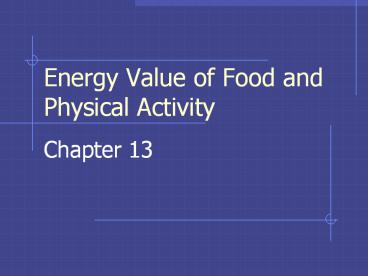Energy Value of Food and Physical Activity PowerPoint PPT Presentation
1 / 17
Title: Energy Value of Food and Physical Activity
1
Energy Value of Food and Physical Activity
- Chapter 13
2
Digestive Efficiency
- Carbohydrate 97
- Lipids 95
- Proteins 97 78 (depending on source Average
92)
3
Human Energy Efficiency
- 40 at best
- Compared to 30 for gasoline / steam engine
- Additional energy liberated as heat
- Provides body heat
- Must be dealt with when large amounts of heat are
produced during exercise
4
Calorie (kcal)
- Energy needed to heat 1 kg water 1 Co
- Big Mac and Fries 783 kcal
- Energy to raise temperature of 196 gallons of
water 1 degree centigrade! - Energy is measured in a bomb calorimeter
5
A CALORIE IS A CALORIE
- ALL CALORIES ARE EQUAL!
6
Oxygen and Calories
- Caloric value of 1 liter of oxygen
- 4.5 kcal for protein
- 4.7 kcal for lipid
- 5.0 kcal for carbohydrate
- We will round all to 5 kcal / liter of O2
- By measuring VO2 we can determine caloric
expenditure (spirometry)!
7
Energy Expenditure
- Basal Metabolic Rate (BMR) - 60-75
- Resting metabolism
- Thermogenic influence of food digestion 10
- Exercise and recovery 15-30
8
Metabolism
9
BMR
- Effected by
- Body Size
- Measured as BSA
- 38 kcal/m2 men
- 36 kcal/m2 women
- Lean body mass
- Gender
- GENETICS
- Generally ranges between 900 1900 kcal
10
Calculating BMR (example)
- What is the BMR of a 6 1 male weighing 195 lbs.
? - First determine BSA using nomogram, then multiply
by BMR constant 24 hours - 38 kcal/m2/hr BSA 24 hr/day
11
BMR
- BSA 2.1 m2
- BMR 38 kcal / m2 / hour X 2.1 m2 X 24 hours
- BMR 1,915 kcals / day
12
Dietary Thermogenesis
- Food intake stimulates metabolism
- Digestion
- Absorption
- Assembly of nutrients (ie proteins)
- Highest 1 hour post eating
- 10-25 of energy of food eaten
- Exercise augments this response (2X)
13
Exercise and Energy Expenditure
- Affected by
- Body mass
- Intensity
- Duration
- Training
14
Energy cost of Exercise
- Same 61, 195 lb. man, running at VO2 of 40 mL
O2/kg/min for 30 min. - What is the total energy expended?
- What is the energy cost for exercise?
- Answer
- First determine O2 consumed
- .04 L O2 X 88.6 kg X 30 min
- 106.32 L O2 consumed
15
Energy cost of Exercise
- Now determine the energy required to utilize
106.32 L O2 - 106.32 L O2 X 5 kcal/liter 531.6 kcal
- Total kcals 532 kcal
16
Energy cost of Exercise
- To determine energy cost of exercise, you must
subtract kcals burned for BMR - 532 kcal BMR30min.
- BMR30min. 38 kcal X 2.1 m2 X .5 hours
- BMR30min. 40 kcal
- Energy cost of exercise 532 40 kcal
- 492 kcal
17
Quantifying work in METs
- MET Metabolic Equivalent
- Multiple of BMR
- IE exercising at 3 METs utilizes three times the
rate of energy at rest for that individual. - In our example
- 492 kcalexercise / 40 kcalBMR 12.3 METs

